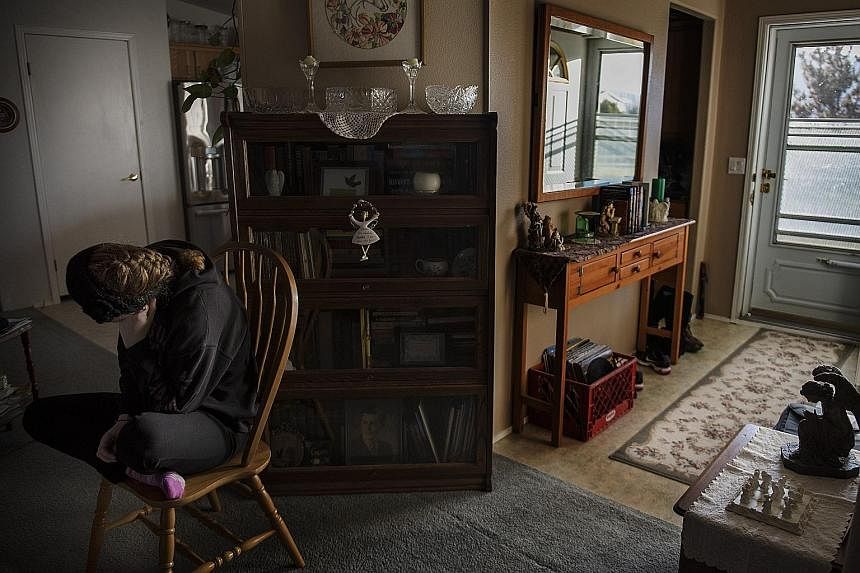NEW YORK - Alex, a 23-year-old Sunday school teacher and babysitter, was trembling with excitement the day she told her Twitter followers that she had converted to Islam.
For months, she had been growing closer to a new group of friends online - the most attentive she had ever had - who were teaching her what it meant to be a Muslim.
Increasingly, they were telling her about the Islamic State in Iraq and Syria (ISIS) and how the group was building a homeland in these Middle Eastern countries where the holy could live according to God's law.
One in particular, Faisal, had become her nearly constant companion, spending hours each day with her on Twitter, Skype and e-mail, painstakingly guiding her through the fundamentals of the faith.
But when she excitedly told him that she had found a mosque just 8km from the home she shared with her grandparents in rural Washington state, he suddenly became cold.
The only Muslims she knew were those she had met online, and he encouraged her to keep it that way, arguing that Muslims are persecuted in the United States.
So on his guidance, Alex began leading a double life. She kept teaching at her church, but began daydreaming about what life with the militants might be like.
"I felt like I was betraying God and Christianity," said Alex, who spoke on the condition that she be identified only by a pseudonym she uses online. "But I also felt excited because I had made a lot of new friends."
Even though the ISIS' ideology is explicitly at odds with the West, the group is making a relentless effort to recruit Westerners, eager to exploit them for their outsize propaganda value.
Through January this year, at least 100 Americans were thought to have travelled to join militants in Syria and Iraq, among nearly 4,000 Westerners who had done so.
Alex's online circle - involving several dozen accounts - collectively spent thousands of hours engaging her over more than six months. They sent her money and plied her with gifts of chocolate.
Extensive interviews with Alex and her family, along with a review of the e-mail, Twitter posts, private messages and Skype chats she exchanged, offered a glimpse into the intense effort to indoctrinate a young American woman, increasing her sense of isolation from her family and community.
"My grandparents enjoy living in the middle of nowhere. I enjoy community," Alex said. "It gets lonely here."
She has lived with her grandparents for almost all her life: When she was 11 months old, her mother, struggling with drug addiction, lost custody of her.
Her therapist says that fetal alcohol syndrome has led to a lack of maturity and poor judgment. That only partly explains what happened to her, her family says.
After dropping out of college last year, she was earning US$300 (S$405) a month babysitting two days a week and teaching Sunday school for children at her church. At home, she spent hours streaming movies on Netflix and updating her social media timelines.
Then on Aug 19, Alex's phone vibrated with a CNN alert. Mr James Foley, a journalist she had never heard of, had been beheaded by ISIS, a group she knew nothing about. She logged on to Twitter to see if she could learn more.
"I was looking for people who agreed with what they were doing, so that I could understand why they were doing it," she said.
"It was actually really easy to find them."
The people who openly identified themselves as belonging to ISIS took the time to politely answer her questions.
"Once they saw that I was sincere in my curiosity, they were very kind," she said. "They asked questions about my family, about where I was from, about what I wanted to do in life."
It was in December that she converted to Islam, and in February, Faisal asked if she would travel to Austria to meet a man who would like to marry her.
In late March, Alex's grandmother decided to confront the man she believed was trying to recruit Alex to ISIS. The family gathered in the living room, Alex's computer propped on the glass coffee table, with a Times reporter and videographer watching.
Her grandmother logged in using Alex's Skype ID. "You need to know she is very important to us," she wrote. "Why would you EVER think that we would let her leave us under the circumstances you were asking?"
He gave his word he would not contact Alex again. Alex agreed to hand over the passwords to her Twitter and e-mail accounts.
Waiting until her grandparents were out, Alex logged in to Skype, the one account her family had forgotten to shut down.
Faisal wrote her right away, and months later they are still exchanging messages. "I told her I would not communicate with you," he wrote. "But I lied."
THE NEW YORK TIMES

